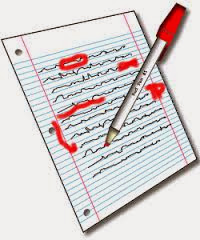Anytime we edit a peer's work we need to remember these three steps: compliments, suggestions, and corrections. Compliments are very important. We want to be able to give feedback that is positive. The author of the work needs to feel like they are being helped and not feel like they are being laughed at. It is also important to remember to give suggestions and not simply tell the author what is wrong with their work. For some people, writing isn't their strong suit, and they may need a little push in the right direction. The last of the three steps is corrections. Corrections help the author learn from their mistakes, so they can learn to be a better writer. There is also one thing that the author needs to keep in mind when getting his or her worked edited by a peer. Do not take corrections or suggestions personally. Remember the person editing is just trying to help , they are not trying to be malicious or degrading. Remembering these tips will help the peer editing process go smoother.
What is Peer editing?
Peer Edit with Perfection
Top 10 Peer Editing Mistakes

Kayla, I agree with you about always staying positive with peer editing personally, I am one of the ones that if you correct to much on something of mine. I get upset because I didn't think I did a good job in the first place.
ReplyDeleteOK Now apply it!
ReplyDelete